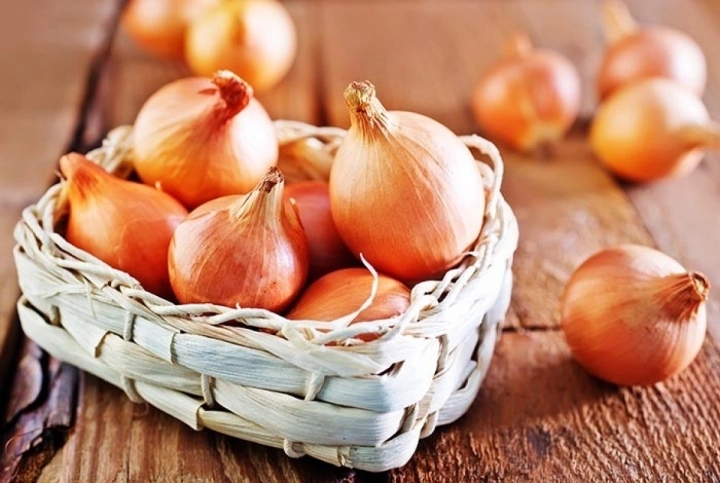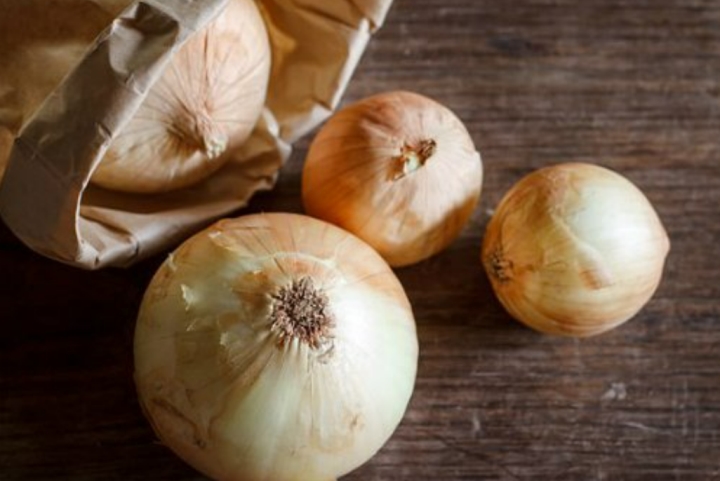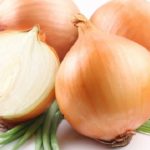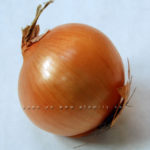Onion is one of the common ingredients that can be used to make many delicious dishes from raw, stir-fry, cook, grill, mix,… To choose good onions, you need to understand the following 3 characteristics, ensuring that your shopping will become much easier.
Observe the peel
A good onion bulb will have a firm, smooth peel, without black spots and tightly enveloping the inner bulb. When choosing, you should choose bulbs with thin, shiny, uniform-colored, dry and firm peels. The best onions must have dry and easy-to-peel skins. Avoid choosing sprouted bulbs, soft and hard spots, and uneven color as these onions are not fresh and may taste bitter.

Tips for choosing good onions.
Therefore, if you see onions like that, you should choose them immediately without hesitation. On the other hand, rough, soft, and swollen onions should not be chosen as they are no longer fresh.
Observe the shape of the onion bulb
One of the secrets to help you choose good onions is to check the external appearance of the onion bulb. When you observe a basket of onions, you will easily notice that they have different shapes. At this point, you should remember to only choose bulbs that are round, as round onions are the best, flat or elongated onions will not be as good as round onions. Also, you should only choose outer bulbs that are still fresh and not crushed.
Observe the roots
Onions have many long fibrous roots indicating that the onions are still fresh. Therefore, if you choose onions with many roots, the taste of the onions will be better and they will last longer. On the contrary, if the onions have completely lost their roots, you should not choose them as they will not be fresh and will spoil faster.
Additionally, we can also feel the tip of the onion when buying. If the tip is very dry, you can choose to buy it, but if the area is moist, it means that the onion has a lot of water and should not be bought because it is too fresh and not easy to preserve, it can easily rot.
Note: Do not buy onions that have sprouted as they cannot stay fresh for a long time.
Tips for storing fresh onions
Store in mesh bags, paper bags, or baskets
If you don’t use up all the onions, you should store them in mesh bags, paper bags, or use socks…. Placing each bulb in a separate bag will make them last longer than storing them all in one place. Note that you need to create air vents so that the onions can “breathe” and not be affected by low humidity or become moldy.

Tips for storing fresh onions
Place the onion basket or bag in a cool, dark place
Place the onion basket or bag in a cool, dark place. The ideal temperature to keep onions fresh is from 5 to 15 degrees Celsius. Avoid keeping onions in places with temperatures below 5 degrees Celsius or above 20 degrees Celsius.
Check the bag or basket containing onions once a week, discard any bulbs that show signs of rot, softness, or color changes. Avoid direct sunlight. High humidity makes onions easily rot. On the other hand, direct sunlight with high temperatures can cause the onions to become dry and dehydrated.
Store leftover onions
You can keep the remaining onions by wrapping them in plastic wrap or using ziplock bags before putting them in the refrigerator. With this method, you can keep the freshness of the onions for 2 to 3 days.
However, the best way is to use a box or jar with a tight lid to store the leftover onions. This helps prevent the smell of onions from permeating other foods in the refrigerator.
Avoid storing onions together with potatoes
Do not store onions together with potatoes because the moisture from the potatoes can make the onions damp and rot faster. At the same time, potatoes can absorb the aroma of onions, making the food have a strange taste.
Source: vtc.vn
Exploring Natural Foods for Allergy Relief
Dealing with allergies can be difficult and uncomfortable, especially for young children. Allergens such as pollen, cosmetics, and insects can cause serious issues for those affected. However, knowledge of the symptoms and taking the necessary precautions can help alleviate the troublesome effects of allergies, like itching, sneezing, and irritation.



































